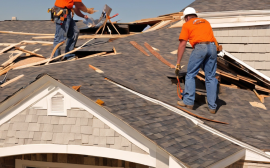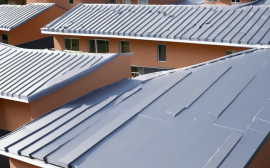Introduction: Facing the Wildfire Threat in Denver
Denver, Colorado, nestled against the majestic Rocky Mountains, offers a unique blend of urban living and access to breathtaking natural landscapes. However, this proximity to wilderness also brings the escalating threat of wildfires, a concern that Denver homeowners must address proactively. The combination of increasingly dry conditions, high winds, and dense vegetation creates a perfect storm for wildfires, making fire-resistant roofing a critical investment, not just an upgrade. Protecting your home from wind-borne embers, a primary cause of wildfire-related property damage, starts from the top down, and a fire-resistant roof acts as the first line of defense.
This article provides a comprehensive guide to fire-resistant roofing options tailored for Denver homes, focusing on materials, installation, and local building codes. Beyond the immediate threat of flames, wildfires pose significant long-term risks, including smoke damage and decreased property values in vulnerable areas. Investing in fire-resistant roofing can mitigate these risks, providing peace of mind and potentially lowering insurance premiums. For example, homes in designated wildfire hazard zones within Denver often qualify for insurance discounts with a Class A fire-rated roof.
Furthermore, a durable, fire-resistant roof contributes to the overall resilience of the home, protecting it from other environmental factors like hail and heavy snow, common occurrences in the Denver climate. By selecting the appropriate roofing material, Denver homeowners can safeguard their investment and contribute to a safer community. Denver’s unique architectural landscape, ranging from historic Victorian homes to modern designs, demands roofing solutions that are not only fire-resistant but also aesthetically compatible. Fortunately, a variety of options are available to suit different styles and budgets.
Metal roofing, while offering superior fire protection, can mimic the appearance of traditional shingles or tiles, preserving the character of older homes. Tile roofing, with its inherent durability and classic appeal, complements Spanish-style architecture prevalent in some Denver neighborhoods. Even fire-resistant asphalt shingles come in a range of colors and textures, providing an affordable and versatile option for homeowners seeking both safety and curb appeal. Ultimately, the best choice depends on individual needs, preferences, and the specific requirements of the property.
Metal Roofing: The Gold Standard for Fire Resistance
Metal roofing stands as a premier choice for homeowners in Denver, Colorado, seeking unparalleled fire resistance. Options such as steel, aluminum, and copper provide exceptional protection against wildfires, a growing concern in the region. The inherent non-combustibility of metal means that these roofs will not ignite from flying embers, a common cause of wildfire-related home damage. Furthermore, metal roofing boasts a Class A fire rating, the highest standard of fire resistance, providing homeowners with peace of mind knowing their property has a robust defense against potential fire hazards.
Denver’s dry climate and proximity to wildfire-prone areas make metal roofing a particularly sound investment for long-term home safety. While the initial cost of metal roofing can be higher than other options like asphalt shingles, its long-term benefits often outweigh the upfront investment. A properly installed and maintained steel roof, for instance, can easily last for 50 years or more, significantly reducing the need for replacements. This durability translates to lower lifecycle costs, making metal roofing a cost-effective solution over time.
Consider also the potential for increased home value; a metal roof is often seen as a premium feature, attracting discerning buyers in Denver’s competitive real estate market. By choosing metal, homeowners are not only investing in fire safety but also in the long-term value and resilience of their property. Beyond fire resistance and longevity, metal roofing offers additional benefits that are particularly relevant to Denver’s climate. Metal roofs are highly reflective, reducing solar heat gain and contributing to improved energy efficiency.
This can lead to significant savings on cooling costs during Denver’s hot summer months. Moreover, metal roofing is environmentally friendly, as it is often made from recycled materials and is fully recyclable at the end of its lifespan. With increasing emphasis on sustainable building practices, choosing metal roofing aligns with eco-conscious values and contributes to a greener Denver community. Homeowners should consult with local roofing contractors experienced in metal roof installation to ensure proper fitting and adherence to Denver’s building codes, maximizing both safety and performance.
Tile Roofing: Durable and Aesthetically Pleasing
Tile roofing, crafted from clay or concrete, stands as another formidable fire-resistant option for Denver homeowners. Mirroring metal roofing in its protective qualities, tile is inherently non-combustible and earns a Class A fire rating, signifying the highest level of defense against flames. The robust nature of tile roofs makes them exceptionally capable of enduring the intense heat generated by wildfires, a critical advantage in regions prone to such disasters. Beyond its functional benefits, tile offers significant aesthetic versatility, seamlessly blending with diverse architectural styles prevalent in Denver, from the classic charm of Victorian homes to the modern lines of contemporary designs.
The ability to customize tile color and shape further enhances its appeal, allowing homeowners to achieve their desired look while prioritizing fire safety. While tile’s weight can present structural considerations, potentially necessitating additional support to meet Denver’s building codes, its exceptional durability and inherent fire resistance make it a long-term, worthwhile investment for safeguarding your home. Unlike some other roofing materials, tile is naturally resistant to pests, rot, and the damaging effects of UV radiation, contributing to its extended lifespan.
Homeowners in areas of Denver frequently exposed to intense sunlight and hail will find tile’s resilience particularly advantageous. Moreover, the excellent insulation properties of tile roofing can contribute to lower energy bills by helping to regulate indoor temperatures year-round. Concrete tiles, in particular, present a compelling alternative to traditional clay tiles, offering similar fire-resistant properties at a more accessible price point. Advancements in concrete tile manufacturing have led to a wider array of styles and colors, mimicking the look of slate or wood shake while maintaining superior fire protection. When selecting tile roofing, it’s essential to consult with a qualified roofing contractor experienced in Denver’s specific building requirements and climate conditions. They can assess your home’s structural capacity, recommend the appropriate tile type, and ensure proper installation for optimal fire safety and longevity. Regular roof maintenance, including clearing debris and inspecting for cracks, will further extend the life of your tile roof and maintain its fire-resistant capabilities.
Fire-Resistant Asphalt Shingles: A Budget-Friendly Alternative
While traditional asphalt shingles are combustible and offer little defense against the spread of wildfires, fire-resistant asphalt shingles present a viable and more affordable alternative for Denver, Colorado homeowners. These specialized shingles are engineered with a fiberglass mat reinforcement and a surface layer of mineral granules, significantly enhancing their ability to withstand extreme heat and resist ignition. This composition allows them to achieve a Class A fire rating, the highest level of fire resistance, providing a crucial barrier against wind-borne embers that are common during wildfires.
When considering asphalt shingles, carefully examine product specifications and certifications to ensure they meet stringent fire safety standards. Fire-resistant asphalt shingles offer a compelling balance of cost-effectiveness and protection, making them a popular choice for homeowners seeking to enhance their home safety without the higher upfront investment associated with metal roofing or tile roofing. In Denver, where wildfires pose a significant threat, this affordability can be a deciding factor for many families. However, it’s essential to acknowledge that even fire-resistant asphalt shingles may not offer the same level of long-term durability as metal or tile.
Proper roof maintenance, including regular inspections and prompt repairs, is crucial to maximizing their lifespan and maintaining their fire-resistant properties. Factors such as Denver’s intense sun and freeze-thaw cycles can impact the longevity of asphalt shingles, so proactive maintenance is key. When selecting fire-resistant asphalt shingles, look for products that meet or exceed ASTM E108 standards, which outline testing procedures for fire resistance of roof coverings. Furthermore, consider the shingle’s wind resistance rating, as strong winds often accompany wildfires, potentially dislodging shingles and exposing the underlayment.
Many manufacturers offer enhanced warranty options for fire-resistant shingles, providing added peace of mind. Remember to consult with a qualified roofing contractor experienced in Denver’s specific climate and building codes to ensure proper installation and compliance with local regulations. They can advise on the best shingle options for your home’s architecture and your specific fire safety needs, taking into account factors such as roof slope and exposure to prevailing winds. Investing in fire-resistant roofing is an investment in home safety and peace of mind in wildfire-prone Denver, Colorado.
Installation and Maintenance: Key to Fire Safety
Beyond selecting the optimal fire-resistant roofing material, meticulous installation and consistent maintenance are paramount for ensuring comprehensive fire safety for your Denver, Colorado home. Proper installation adhering strictly to the manufacturer’s specifications and all applicable local building codes is non-negotiable. This initial step forms the bedrock of your roof’s ability to withstand wildfire threats. For instance, Denver’s stringent building codes often mandate specific underlayment materials and fastening techniques for fire-resistant roofing, particularly in designated wildfire-prone areas.
Engaging a roofing contractor experienced in Denver’s unique requirements is crucial to guarantee code compliance and optimal protection. Improper installation, even with the best materials, can compromise the entire system’s fire resistance. Regular inspections are equally vital. Denver’s intense sun and fluctuating temperatures can accelerate wear and tear on roofing materials, potentially creating vulnerabilities. Conduct thorough visual inspections at least twice a year, ideally in the spring and fall, looking for telltale signs of damage.
These include missing, cracked, or curled shingles (especially critical for fire-resistant asphalt shingles), damaged or corroded metal panels (a concern even with durable metal roofing), and cracked or displaced tiles. Address any identified issues promptly. Small repairs can prevent minor problems from escalating into major vulnerabilities that could compromise your home’s defense against wildfires. Neglecting maintenance on even a fire-resistant roof can reduce its effectiveness over time. Furthermore, proactive landscaping practices significantly contribute to mitigating fire risks.
Maintaining clean gutters is essential to prevent the accumulation of leaves, pine needles, and other flammable debris, particularly prevalent in Denver neighborhoods with mature trees. These materials can act as kindling, igniting easily from embers carried by the wind during a wildfire. Similarly, trimming trees and shrubs around your home, especially those overhanging or close to the roof, minimizes the pathway for fire to spread from vegetation to the structure. Aim for a defensible space of at least five feet around the perimeter of your home, free of combustible vegetation.
Regular professional roof inspections, conducted by a qualified roofing contractor familiar with fire-resistant roofing systems and Denver’s specific environmental challenges, can identify subtle issues early on and ensure your roof continues to provide optimal protection against wildfires. Finally, consider the often-overlooked aspect of attic ventilation. While a sealed attic might seem intuitively safer, proper ventilation is crucial to prevent the buildup of heat and moisture. Excessive heat in the attic can degrade roofing materials over time, reducing their fire resistance.
Furthermore, in the event of a fire, proper ventilation can help to vent smoke and heat, potentially slowing the spread of the fire and improving the chances of firefighters being able to save your home. Ensure that your attic ventilation system complies with local building codes and is properly maintained to ensure optimal performance. Remember, a holistic approach to fire safety, encompassing material selection, installation, maintenance, and landscaping, is the best way to protect your Denver home from the devastating effects of wildfires.
Navigating Denver’s Building Codes for Fire Safety
Denver’s commitment to fire safety is reflected in its stringent building codes, particularly within designated wildfire hazard zones that fringe the foothills and open spaces. These codes are not merely suggestions; they are legally binding requirements designed to minimize the risk of fire damage to homes. Homeowners planning a roof replacement or new construction must meticulously familiarize themselves with these regulations. The Denver Building Code outlines specific requirements for fire-resistant roofing materials, installation techniques, and necessary inspections.
Failure to comply can result in significant fines, project delays, and, most importantly, compromised home safety. Resources like the Denver Community Planning and Development website offer detailed information, but navigating the complexities often necessitates expert guidance. Understanding the nuances of Denver’s fire-resistant roofing requirements often requires professional assistance. A qualified roofing contractor with specific expertise in Denver’s building codes can be an invaluable asset. These professionals possess in-depth knowledge of acceptable materials, proper installation methods for optimal fire resistance, and the permit application process.
For instance, in certain high-risk areas, the code may mandate Class A fire-rated roofing materials, effectively precluding the use of standard asphalt shingles, even if they are a more budget-friendly option. They can also advise on crucial details such as proper underlayment installation and ember-resistant detailing around vents and eaves, which are often overlooked but critical for preventing wildfire embers from igniting the roof structure. Permits are almost always required for roof replacement or significant repair projects in Denver, ensuring that all work adheres to the current building codes and safety standards.
The permit application process typically involves submitting detailed plans, specifications of the chosen fire-resistant roofing material, and contractor information to the Denver Building Department. Inspections are then conducted at various stages of the project to verify compliance. Engaging a licensed and insured roofing contractor streamlines this process, as they are typically well-versed in the necessary paperwork and inspection protocols. Moreover, regular roof maintenance, including clearing debris from gutters and removing vegetation near the roofline, is crucial for maintaining fire safety and preventing the accumulation of combustible materials that could exacerbate a wildfire situation. Proactive maintenance, coupled with a code-compliant fire-resistant roof, provides the best defense against the ever-present threat of wildfires in the Denver area.
Conclusion: Investing in Peace of Mind
Protecting your Denver home from the escalating threat of wildfires demands a proactive and informed approach, with the selection of a fire-resistant roofing system serving as a cornerstone of defense. Metal roofing, tile roofing, and fire-resistant asphalt shingles each present distinct levels of protection, balancing advantages with specific drawbacks in terms of cost, aesthetics, and installation requirements. By carefully evaluating your budget constraints, architectural preferences, and adherence to Denver’s stringent local building codes, you can make an educated decision that best suits your individual needs and property characteristics.
Remember, a fire-resistant roof is not merely an upgrade; it’s a critical investment in safeguarding your family and assets against the unpredictable nature of wildfires. Beyond the initial material choice, the long-term effectiveness of any fire-resistant roofing system hinges on meticulous installation and consistent maintenance. Denver’s climate, characterized by intense sun exposure and frequent freeze-thaw cycles, can accelerate the degradation of roofing materials, potentially compromising their fire-resistant properties. Regular inspections are crucial to identify and address any signs of damage, such as cracked or missing tiles, loose shingles, or corrosion on metal panels.
Promptly repairing these issues not only preserves the roof’s structural integrity but also ensures that its fire-resistant capabilities remain uncompromised. Furthermore, maintaining clean gutters and removing accumulated debris, such as pine needles and leaves, minimizes the risk of ember ignition and subsequent fire spread. Investing in a fire-resistant roof in Denver is more than just a practical decision; it’s an investment in peace of mind. The emotional toll of experiencing a wildfire threat is significant, and knowing that your home is equipped with a robust defense against potential ignition provides invaluable reassurance.
Moreover, a fire-resistant roof can positively impact your property’s value, making it a more attractive and secure investment for potential buyers. As wildfires become increasingly prevalent in the Denver area, homeowners who prioritize fire safety are not only protecting their own properties but also contributing to the overall resilience of their communities. By taking proactive measures, we can collectively mitigate the devastating effects of wildfires and preserve the beauty and safety of our beloved city.



